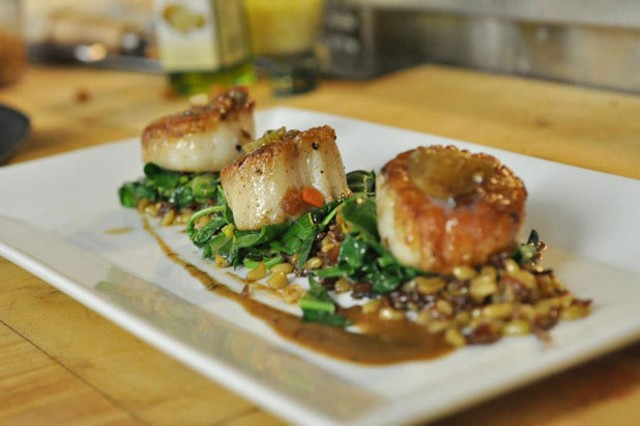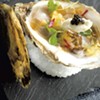Published January 30, 2013 at 11:14 a.m.
It’s just after 3:00 on a Thursday afternoon, and inside the Gleanery’s sunny kitchen, Ismail Samad scoops out the warm insides of roasted potatoes and tosses them in a silver bowl. As he does so, what look like tiny pebbles fall from the skins.
“One of our farmers is from Brittany, and she brought back this gray salt,” the soft-spoken chef says, rubbing some between his fingers. The sea salt draws out the potatoes’ moisture and renders the insides easier to work with, Samad explains; he’ll use them to make gnocchi.
Behind him, Alice James, her hair tucked into a purple knit cap, stirs a pot of veal stock and chats with a prep cook who’s mixing achiote into what will become sweet-potato empanadas. Nearby, a pair of sourdough loaves rise on a baking sheet, and a pillow-size bag of spinach from Putney’s High Meadows Farm awaits its fate.
Two hours before service, this kitchen is filled with powerful savory, sweet and pungent aromas, but the atmosphere is so quiet, it’s hard to believe the Gleanery has been open for only a few weeks. Perhaps it’s because the trio who founded it — Samad, James and manager Liz Ehrenberg — thought about this place for so long that they’d worked out many of the details before they even landed a lease.
Putney’s newest restaurant inhabits a stately 1700s building on Main Street and serves up, among other delicacies, plates of scallop ceviche and white chocolate rose crème brûlée. These sumptuous results are based on two humble premises: that the imperfect pumpkins, lettuces and even mugs of the world need a home; and that a restaurant can become an integral part of its community by turning those “seconds” into something delicious.
“Basically, farmers can bring us anything that’s bruised or unsellable,” James says, from surplus tomatoes and beets to slightly bruised squashes to local cheeses that have been aged a touch too long but are still quite delicious.
In Samad’s and James’ hands, those beets might end up in a jasmine-beet purée served with scallops and jalapeño. Goat cheese might become part of monkfish with chèvre risotto and Meyer lemon-parsnip purée; surplus pumpkins might be spun into a soup with lavender and ginger.
Samad, James and Ehrenberg had been talking about the concept behind the Gleanery for at least two years, since they became friends while working at the nearby Putney Inn. The arrangement there was similar to the one they would eventually (though not deliberately) re-create: Samad was chef, James worked alongside him and Ehrenberg managed the inn.
“It was always ‘Oh, if we owned our own restaurant…’” Ehrenberg recalls, echoing many a chef’s thought. “We talked about a lot of conceptual stuff.”
The three envisioned gleaning from farmers who produce a surplus each season, as well as funding their restaurant with the support of community members who would buy shares in the business (similar to the model of Hardwick’s Claire’s Restaurant & Bar).
The gleaning idea grew partly from Samad’s connection with local farmers. The chef hails from Cleveland and has worked in kitchens there and in New York. After he moved to Vermont with his native-born wife, Samad became involved with the Windham Farm and Food Network, a hub for local farms. He learned that farms often had vegetables that went unused, either because of overproduction or because the produce sat on the shelf too long. Rather than ordering his ingredients based on a rigid menu, Samad thought, What if menus were built around what farmers had to offer?
The three friends kept in touch after Samad went to work as head chef at the Wilmington Inn; when he heard that Putney’s Front Porch Café was closing and the space might be available to lease, he told the other two. Together, they worked up a business plan and entered an annual competition held by the Brattleboro Development Credit Corporation and Strolling of the Heifers. Their plan beat out 60 or so other applicants for a $5000 grant.
After the trio won, the hunt was on for community members willing to buy $500, $1000 and $1500 shares to be spent over the restaurant’s first three years of life. To generate support, Samad and James cooked for locally hosted tasting dinners and hit the Putney Farmers’ Market each weekend for a demo called Shop With the Chef. The pair gathered each week’s available produce and cooked it up to offer marketgoers a taste of the Gleanery’s fare. They also launched a Kickstarter campaign that eventually raised $10,550, far exceeding their goal.
By fall, nearly 100 members were on board with the Gleanery’s concept — which is both economic and philosophical. “We were always very transparent about it,” explains Ehrenberg. “We didn’t mind imperfect vegetables. It’s like, get over it.”
As she talks, Ehrenberg lights a fire in the brick fireplace to heat up the chilly dining room, which is spacious with heavy beams, small-paned windows, a fireplace at one end and French doors at the other. The trio wanted to celebrate the space’s spare, almost colonial vibe rather than smother it. “That was also part of our ethos. How do we honor this [space] and embrace it for what it is?” Ehrenberg says.
The “seconds” concept extends to the décor. The partners bartered with a local architect for design, and members and friends (including James’ boyfriend, Matt Doolittle) donated time, surplus materials and expertise to build the tables and counters, and will soon manage the Gleanery's new café. A few of the dining room tables were built using a cherry tree that had been hit by lightning, and a central communal table was conjured from a donated bowling-alley floor. Even the mugs were made by students at a local pottery school, and other artisans and studios donated seconds for plates, dishes and bowls.
“We want to create handmade food on handmade plates,” Samad explains. He and James arrive around 10 each morning to plot that night’s menu based on what’s available — which, of course, includes a lot of unexpected seconds. “We don’t have to force-feed it anymore,” he says of the produce, which flows in from a network of local farms. Setting up that network took years of building relationships, but Samad says it now runs smoothly.
Dealing with seasonal excess has given rise to another integral part of the Gleanery’s process: preserving, canning, fermenting and pickling. James likes to call the kitchen a “fermentorium,” and, indeed, it’s filled with pickled veggies, kefir, jars of homemade chili powder and vinegars fermenting from local fruit wines.
Of course, the team does seek out some foods, especially proteins, to augment or anchor the menu. On a dry-erase board in the kitchen, rough notes plot out the day’s menu: “ven stew-rutabaga.” “Duck” is scrawled across the top to remind Samad or James to call a local farmer about the birds.
Duck is not on the menu this night, but venison-rutabaga stew bubbles on the stove. Samad combines cubed butter with carrots and tarragon for a purée, and trims veal chops to make meatballs. James whisks up kombucha vinaigrette for the evening’s salad. Even though it’s 10 minutes before service, the two move around each other quietly — tending pots, sliding a tart out of the oven, deciding which cheese will go on that night’s cheese plate.
Ehrenberg says she is often asked, “What kind of cuisine does the Gleanery serve?” Scallop ceviche, sauerbraten, spaetzle and empanadas have all appeared on the menu at one time or another. “It’s the hardest question to answer,” she says. “It’s really a little bit of everything, but always high quality.”
Ehrenberg disappears to print the night’s menu. At 4:45, Doolittle lights white candles on each table. The room has grown toasty, and soon the first guest arrives. Nancy Shepherd of Putney puts her stuff down at a table and then stands with her back to the fire as if in her own living room. She explains why she became a Gleanery member. “I was in the middle of renovating my kitchen and feeling broke, but I just loved this concept so much, I had to do it,” Shepherd says. This is her second visit.
By 5:30 p.m., a few more guests have arrived and orders trickle into the kitchen. Samad arranges veal meatballs over housemade fettuccine and bright-yellow tomato purée. The spinach has been chiffonaded, drizzled with tangy kombucha vinaigrette and topped with roasted beets, roasted cashews, and charred fennel and onions. It’s smoky, complex and delicious.
Samad has decided to pair the gnocchi with roasted red peppers, arugula and a smear of carrot purée, then top it with a poached, quivering quail egg. On this icy January night, the plate is a riot of color. Almost as soon as he sets it down, Samad turns away to compose another.
The Gleanery, 133 Main Street, Putney, 387-3052. Dinner served Wednesday through Saturday, 5 to 9 p.m.; family-style meals served Sundays. BYOB. thegleanery.com
The print version of this article was headlined "Turning 'Seconds' Into Firsts".
More By This Author
Speaking of Food, localvore Movement
-

Q&A: Howard Fisher Delivers Meals on Wheels With a Side of Good Cheer
Dec 20, 2023 -

Video: Howard Fisher Delivers Meals on Wheels
Dec 14, 2023 -

Q&A: Alexis Dexter Rescued 57 Shelter Cats During the July Flood
Sep 13, 2023 -

Video: Two Months After the Flood, Alexis Dexter Rebuilds Kitty Korner Café in Barre and Continues to Rescue Cats
Sep 7, 2023 -

Video: Saying Goodbye to Burlington’s Penny Cluse Café
Nov 17, 2022 - More »
Comments
Comments are closed.
From 2014-2020, Seven Days allowed readers to comment on all stories posted on our website. While we've appreciated the suggestions and insights, right now Seven Days is prioritizing our core mission — producing high-quality, responsible local journalism — over moderating online debates between readers.
To criticize, correct or praise our reporting, please send us a letter to the editor or send us a tip. We’ll check it out and report the results.
Online comments may return when we have better tech tools for managing them. Thanks for reading.














































